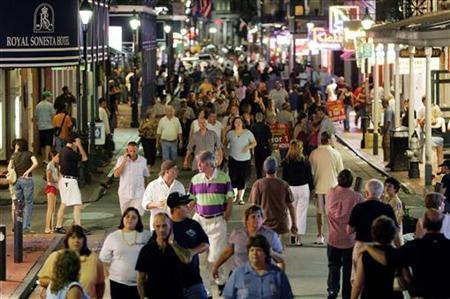New Orleans Lifts Ban on Night Time Street Preaching
The New Orleans City Council voted last week to lift the 2011 ban against street preaching from sunset to sunrise on the city's famous Bourbon Street, a popular site for tourists and pro-gay festivals.

The city council voted recently 6-0 to amend the city's "aggressive solicitation" ordinance enacted in 2011 but suspended by U.S. District Judge Eldon Fallon in September. The council voted to remove two phrases from the ordinance; one which bans any person or group from gathering on Bourbon Street "for the purpose of disseminating any social, political or religious message between the hours of sunset and sunrise."
Additionally, the new ordinance no longer contains the term "Bourbon Street," and no longer includes a ban on "conduct which reasonably tends to arouse alarm or anger in others." The new ordinance only bans conduct that involves heckling someone for the sole purpose of harassment.
The city council revised the ordinance at the request of U.S. District Judge Carl Barbier, who is currently weighing the legality of the ban after multiple street preachers were either arrested or threatened with arrest at the Southern Decadence pro-gay festival in 2012.
One of those preachers, New Orleans-based pastor Paul Gros of Vieux Carre Assembly of God Church in the French Quarter, filed a lawsuit against the City of New Orleans for criminalizing religious speech through the ordinance. Pastor Gros and other Christian preachers had often gathered on the touristy Bourbon Street, even during pro-gay festivals, to preach the bible, including messages focusing on Scripture that describe homosexuality as a sin.
Although Gros was only threatened with arrest, another group of nine Christian activists was arrested at the Decadence Festival during Labor Day weekend 2012. Following these arrests, U.S. District Judge Eldon Fallon granted a temporary restraining order on the city ordinance in September 2012.
Gros' lawsuit was then consolidated with the lawsuit of the Christian activists and the lawsuit of preacher Kelsey McCauley, who was also threatened by police for preaching on Bourbon Street, but not taken into custody.
The city's legal advisor Ron Pursell told the council last week that it had been asked by a judge to revise the ban on "aggressive solicitation," and therefore chose to change the city ordinance.
"As you know, this is a matter that is in litigation, and the city has received a request, if you want to put it that way, from the federal judge to alter the language of the city code -- of this section of the city code -- that would make it palatable for the court and constitutional," Pursell told the council, as reported by The Times-Picayune. Pursell added that the ordinance's new language "has also been approved by our office as well as the attorneys on the opposing sides."
The new ordinance goes into effect immediately and does not necessarily mean the consolidated lawsuit against the city will be dropped.
Nathan Kellum, the attorney representing Gros in his ongoing lawsuit, told the Associated Press that it is not surprising the city council altered the language of its ordinance.
"It's not surprising that the city repealed that language. They were constrained to do something. I think they waited as long as they could," Kellum told the AP, adding that he believes the court should recognize that his client's constitutional rights were violated when he was threatened with arrest for preaching on Bourbon Street.
"He wanted to share a message. He was kept from sharing a message. There has to be a recognition of that patent constitutional violation; there has been none," Kellum added.





















